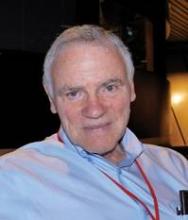TAMPA – Paradigm changes drive radical changes in science, according to Dr. Leroy Hood, a renowned scientist and inventor who joined forces with Ohio State University to create the P4 Medicine Institute to "drive innovative approaches to disease prevention and maintenance of health and wellness by applying systems biology to medicine and care delivery."
P4 medicine (Predictive, Preventive, Personalized, Participatory) "is really the convergence of three megatrends in medicine: systems medicine on one hand, big data and its analytics on the other hand, and patient-activated social networks," Dr. Hood, president of the Institute for Systems Biology, Seattle, said at the annual meeting of the Society of Gynecologic Oncology.
As an invited presidential lecturer at the meeting, Dr. Hood described the two central features of systems medicine and how they will facilitate P4 medicine. The first feature is the idea that in the next 5-10 years, individuals will have a "virtual cloud of billions of data points."
"Biological networks exist at the level of genes, the level of proteins, the level of cells, the level of organs, and obviously at the level of the individual through social networks. What is really critical is that in disease, that ‘network of networks’ becomes disease-perturbed and it alters the nature of the information it can handle. If you can capture that altered information, you gain fundamental new insights into biological mechanisms and you can design new strategies both for diagnosis and for therapy," Dr. Hood said.
What is lacking in American medicine, however, is the second feature of systems medicine: an understanding of the dynamics of how these disease-perturbed networks change with time throughout the course of the disease.
P4 medicine differs from evidence-based medicine in that it is proactive rather than reactive; it is focused on the individual and, increasingly, on wellness; it is "all about creating, for each patient, this global data cloud that gives us deep insights into the individual" and that produces predictive and actionable models of wellness and disease; and, most fundamentally, it "argues that the current clinical trial system is totally broken," Dr. Hood said.
"The idea that for a cancer diagnosis, you take 30,000 patients, give them a placebo drug, extract from the patients and put in curves their responses, and from those curves you make generalizations about how to treat the population and how well the drug has done, is wrong in every way. Each individual is different genetically and environmentally," he explained, noting that P4 medicine analyzes "the unique individual and then aggregates those into groups in accordance with what environmental opportunities you’d like to explore."
Acceptance of this new health care concept will depend upon patient-activated social networks, he said.
"I think that’s the only way we can change the incredibly conservative nature of both physicians and the health care system itself," he added.
P4 medicine is mainly about two things – quantifying wellness and demystifying disease, he said.
In contemporary health care, with regard to these two fundamental concepts, three major things have been missing: metrics for wellness, the ability to do longitudinal studies of disease, and the ability to do studies at the point of initiation. A study now underway based on the concept of P4 medicine will allow for all three.
It is a Framingham-like longitudinal study that aims to enroll 100,000 individuals who will be followed for 20-30 years. Participants will quickly be divided into two groups, including those who remain well or improve in health, and those who transition from wellness to disease.
Very soon, the study population will be large enough to see all major diseases, including cancer.
"But the really important point is that we’ll have multiple data points all the way across this longitudinal study so we can go back to the earliest origins of the divergence of wellness to disease for a particular patient, and we can look at mechanisms and new approaches to diagnostics, and hopefully change that disease trajectory very early on to a wellness trajectory," he said.
The first phase of the study, which launched in March, will enroll 1,000 individuals within a year, working up to 10,000 and ultimately to 100,000.
The plan is to collect numerous measurements, including "physical trait kinds of measurements," clinical chemistries, and special measurements of the gut microbiome and organ-specific blood protein fingerprints to monitor wellness-to-disease transitions in the brain, heart, and liver.
"And all of these data will be integrated together by analytics to create these models for each individual that are all focused on identifying and prioritizing a series of actionable traits.


